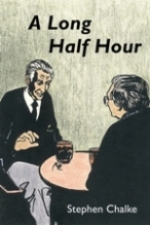A Long Half Hour
Martin Chandler |Published: 2010
Pages: 128
Author: Chalke, Stephen
Publisher: Fairfield Books
Rating: 4.5 stars

On the cover of A Long Half Hour is a drawing of Stephen Chalke in the company of former Somerset pace bowler Ken Biddulph. They are sat at a table enjoying a pint of beer and reminiscing. It is an entirely appropriate image given Chalke’s remarkable talent for making his reader feel as though he is at that table with them, enjoying the conversation.
There are six men featured in the essays that make up this book. Chalke has written about all of them in the past, either in the match accounts in Caught In The Memory, or the magazine articles collected in The Way It Was, or both. About all of them Chalke felt there was more worth saying – he was undoubtedly correct in that assessment.
The first subject is Biddulph. Chalke initially met him when he engaged his coaching services back in 1993 in an effort, at the age of 45, to reverse the decline in form he had suffered that season. Biddulph succeeded in his brief but, much more importantly for the rest of us, it seems that his fund of stories about his cricket career was the catalyst for Chalke’s cricket writing. That is a matter for us all to celebrate and surely, the wickets he took notwithstanding, Biddulph’s greatest legacy.
Moving on there is a delightful chapter on Arthur Milton who was, when the conversations on which it is based took place, the last man alive to have played cricket and football for England. We learn just how talented an all round sportsman Milton was, as well as how modest and self effacing. He seems to be an example of a man who, lacking the streak of ruthlessness that would have brought him all the success his talent made him capable of, slightly underachieved in his career – but only statistically.
Next is a piece on Geoff Edrich, of the famous Norfolk brethren, who batted with distinction for Lancashire for a decade after the war. During his war service Edrich had been a prisoner of the Japanese and, as with all who suffered that fate, saw things no man should ever have to see – as with so many of his contemporaries the rest of Edrich’s life was shaped by his war time experiences.
An old favourite of Chalke’s is Bomber Wells, the former Gloucestershire and Nottinghamshire off spinner. Bomber was one of the greatest characters cricket has seen and, as with the double international, the professional game will never be graced by his like again. Tales of Bomber’s eccentricities, on and off the field, are legion and a goodly number are told here. Many sound apocryphal but Chalke’s wide ranging conversations with Bomber’s contemporaries demonstrate that there is a much larger grain of truth in them than might at first blush seem likely. As with all six men featured Bomber is sadly no longer with us, but a part of his spirit lives on in all those whose lives he touched. To give a flavour of the man, and consequently of A Long Half Hour, CricketWeb is delighted to be able to reproduce Chalke’s celebration of Bomber’s life that first appeared in The Wisden Cricketer and, later, in The Way It Was.
The penultimate essay is about Dickie Dodds – a true entertainer. He was an opening batsman for Essex who put bat to ball from the opening delivery of an innings. His life was defined by the Moral Rearmament movement, now known as Initiatives of Change, an organisation of which West Indian opening batsmen Conrad Hunte was also a member. Chalke gives us a glimpse of a remarkable life that was underpinned by an admirable, if in many ways rather eccentric, set of values.
Last of this selection is Somerset batsman Eric Hill, the least successful cricketer of the six but, I sensed, perhaps a man who Chalke sees as being one who got away in a literary sense. Hill’s debut against Middlesex, a remarkable match in itself, is the central theme around which the essay is constructed. After his five largely undistinguished seasons at Taunton Hill spent the rest of his working life in the press box, and he comes across as a fascinating man – his pragmatic views on that Somerset enigma Harold Gimblett are, for example, a stark contrast to the more usual reverence directed towards Gimblett, an attitude apparent in the chapter on Ken Biddulph.
Stephen Chalke is, as ever, at the top of his game in A Last Half Hour, and had the book been a little longer I would certainly have felt obliged to give him five stars, as I have done twice before. Anyone who has enjoyed his previous books will not need my endorsement to persuade them to add this one to their collection but, for anyone unfamiliar with his work but interested in it, this is an excellent place to start.






Leave a comment